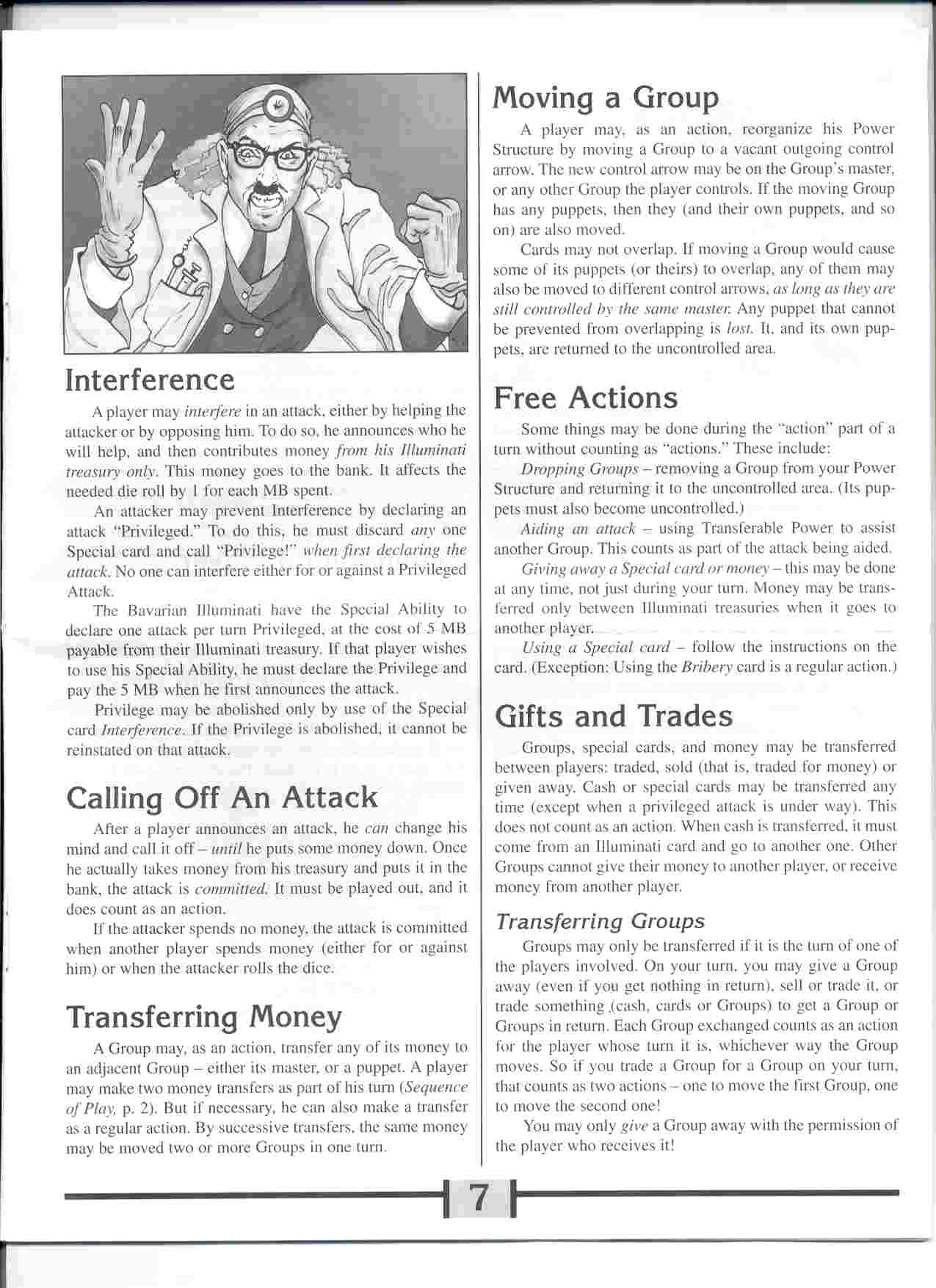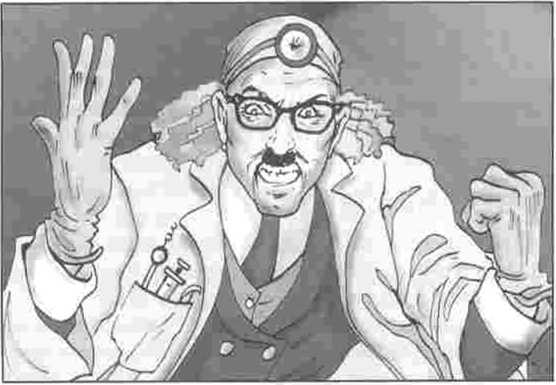36135 rulespage7


Interference
A player may interfere in un utlack. eitherby helping the ailacker or by opposing Inni. To do so. he announces wlio he will help, and thcn contributes money firnu his Ulurftiruiri treasury ordy. Tliis money goes to ihe bank. Lt atTects the needed die roli by I for eaeh MB spent.
An attaćker may prevem Interference by dedarmg an attack “Privileged.” To do this, he must disami any one Special card and cali "Privilege!" when fiest declartng the attack. No one can interfere either for or against a Privileged Attack.
The Bavarian llluminati have the Special Ahilily to declare one attack per tum Pri\ilcged. at the cost of 5 MB payablc from iheir llluminati treasury. If that player wishes to use his Special Ability. he must declare the Prmlege and pay the 5 MB when he first announces the attack.
Pm ilege may he abolished only by use uf the Special card Interference. If the Pmilege is abolished. it cannot be reinsiated on that attack.
Calling Off An Attack
After a player announces an attack. he can change his mind and cali ii off - miii he puts sonie money down. Onee he actually tak es money from his treasury and puts il in the bank, the attack is commilted. It must be played out. and it does count as an aetion.
If the attaćker spends no money. the attack is comtnitted wiien another player spends money (either for or against him) or when the attaćker rolls the dice.
Transferring Money
A Group may, as an aetion. transfer any of its money to un adjacent Group - either its master, or a puppet. A player may make two money transfers ;ls part of his turn (Sequen.ce uf Pla\\ p. 2). But if nccessary, he can also make a transfer as a regular aetion. By successive transfers. the same money may be moved two or morę Groups in one tura.
Moving a Group
A player may. as an aetion. reorgani/e his Power Structure by moving a Group to a vacant outgoing control arrow. The new control arrow may be on the Group's master, or any otlier Group the player Controls. If the nioving Group has any puppets. then they (and iheir own puppets. and so on i are also ntoved.
Cards may not overlap. If nioving a Group would cause some of its puppets (or theirs) to ovcrlap, any of them may also be tnoved to different control arróws. as long as they are still cottlrolled by the same master. Any puppet that cannot be prevented from overlapping is łosi. It. and its own pup-pets. are retumed to the uncontrolled area.
Free Actions
Some things may be done during the “aetion" part of a turn without counLing as "actions.” These include:
Dropping Groups - rempving a Group from your Power Structure and retuming it to the uncontrolled area. (Its puppets must also become uncontrolled.)
A iding an attack - using Transferable Power to assist another Group. This counts as part of the attack being aided.
Giring away a Special card or money - this may be done at any limę, not jusi during your tum. Money may be trans-ferred only between llluminati treasuries when it goes to another player.
Using a Special card - follow the instructions on the card. (Exception: Using the liribery card is a regular aetion.)
Gifts and Trades
Groups, special cards, and money may be transferred between players: rraded, sold (that is. traded for money) or given away. Cash or special cards may be transferred any time (except when a privileged attack is under wayi. This does not count as an aetion. When cash is transferred. it musi come from an llluminati card and go to another one. Otlier Groups cannot give iheir money to another player, or receive money from another player.
Transferring Groups
Groups may only be transferred if it is the turn of one of the players invoIved. On your turn, you may give a Group away (even if you get nothing in return), soli or irade it. or trade something.tcash, cards or Groups) to get a Group or Groups in return. Eaeh Group exchanged counts as an aetion for the player whose tura it is. \vhtchever way the Group moves. So if you trade a Group for a Group on your tum, that counts as two actions - one to movc the first Group, one to move the seeond one!
You may only give a Group away w illi the permission of the player w ho receiyes it!
Wyszukiwarka
Podobne podstrony:
93 (26) SPECIAL OVERSEAS SUBSCRIPTION OFFERWherever you live in the world, try a six-month subscript
08 (11) Part 2Do not start this part unless told to do so by your test supervisor.Ouestions 41 - 50
73975 Orwell0002 ■d Ae befezYioor ofihe women, in particular, is such that the army, I believe, does
*No action will be taken by the police or by thę couru against any ifci/b in respca of his pa« acriv
IMG#08 20 Associative Principles and Democratic Reform yoluntary associations in order to do so. Ass
DSCN4034 Humań erolurion in a geologicai context Curves showing the decay of a radIoactive pa rent (
33436 Slajd28 (134) JTAG The JTAG interface is accessed through four of the AYR s pins. In JTAG term
Interface Arduino tltrough Lab VIEW: Step 1: In LabYlEW (any version) establLsh the fol Iow i ng fro
1 ■ * i •• ) K S v I 481. Stepanek, R. (NS). Application of laser interferometry in
więcej podobnych podstron